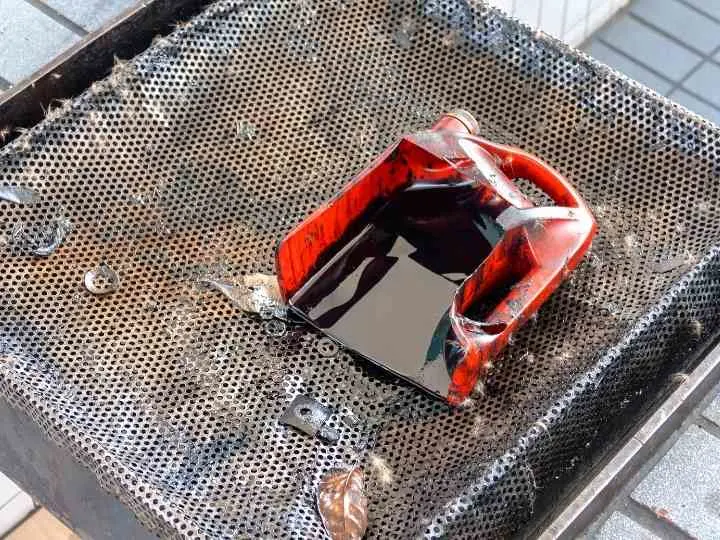When most people think of oil, they are often reminded of its nickname “black gold.”
However, when it comes to your car’s engine and the oil it contains, it may or may not be a good thing if you have black oil when you look at your dipstick.
Is engine oil supposed to be black, and what if it is? Here’s everything you need to know!
When you first open up a bottle of engine oil, it will not be black. Instead, its color will be one that is very transparent and amber in appearance. Oil becomes darker over time as it picks up contaminants from use.
In fact, if you did not know better, you would swear you were looking at honey, which is what new engine oil looks like when it’s put into your engine!
Once you put new oil in your engine, don’t expect it to continue looking like honey for very long. As the oil circulates throughout your engine, it goes through what are known as heat cycles.
This refers to each time your car’s engine reaches its normal operating temperature, which is just a bit shy of 220 degrees Fahrenheit.
As your engine’s oil completes one heat cycle after another, the oil becomes somewhat darker each time.
This is actually a good thing for your car since this indicates the oil is working its way through your engine and completing its heat cycles as it should.
Does Synthetic Oil Turn Black?
If you are using synthetic oil in your car’s engine rather than oil that is petroleum-based, it will also turn black over the course of time.
Any type of engine oil, be it synthetic or petroleum-based, contains various additives that play a role in your engine oil turning black.
The additives, which are chemical compounds designed to increase the lubrication ability of the oil within the engine, are very much necessary in today’s modern vehicle engines.
Without the additives, your car’s engine would become damaged and ultimately fail.
When you are using synthetic oil, black oil will be inevitable.
Even if you are not driving your car very much and not subjecting the oil to heat cycles, the additives will still make it turn black over time.
Is Diesel Engine Oil Black?

Since diesel engines differ in many ways from other types of engines, you may be wondering if diesel engine oil is supposed to be black.
It is perfectly normal for diesel engine oil to be black. In fact, it is almost black when initially put into the engine.
Darker than other engine oils, diesel engine oil will be dark when first put into the engine, and will get significantly darker much faster than oil found in other engines.
In most diesel engines, the oil will turn almost completely black within only several hundred miles following an oil change.
Unlike traditional combustion engines found in most vehicles, diesel engines are made so that they produce more soot and sludge.
As a result, the oil becomes dirtier quicker, which explains why it turns a dark black color so quickly.
What Should I Do if My Oil is Black?
If you notice your engine’s oil is black when you pull out the dipstick, the first thing to do is not panic. After all, it’s perfectly normal for your engine oil to turn black over the course of time.
Depending on how long the oil has been in your car, the black color may or may not indicate it’s time for an oil change.
As you drive your car, your engine oil will be made darker by various contaminants.
Most of the time, these will be small metal particles from the engine that break away and get into the oil.
Also, dirt and dust that comes from normal driving will make your oil darker, especially that which is not trapped by the oil filter.
If you have just changed your oil recently and notice your car’s oil is black, this could indicate a potential problem.
Remember, engine oil that is black is a clear sign the oil has less viscosity, meaning it cannot flow as easily as it needs to throughout your car’s engine.
When this occurs, the result is various moving parts of your engine not being lubricated as well as possible, which could lead to engine damage if the problem is not corrected.
To be on the safe side, you should take your car to a mechanic when you have concerns about your engine’s oil becoming black sooner than you expected.
At the least, your mechanic can perform an oil change, check out your engine to see if any parts are worn out, and answer any questions you may have on your mind.
If you get an oil change, drive your car several hundred miles, then check your oil to see if it is turning black.
If the transformation seems to be gradual, chances are everything is working normally.
What Color Indicates Bad Engine Oil?

While engine oil that is black may indicate your car’s oil is old, dirty, and needs to be replaced, there are other colors that may point to a problem with your car’s oil.
Should your engine oil have a cream-like color and appears to be somewhat foamy, you’ve probably got a head gasket leak.
Along with the oil having a cream-like color, this problem is also confirmed by white smoke coming from your car’s exhaust and your vehicle using an increased amount of coolant.
In situations where your engine oil looks like milk that has been diluted, this probably means your engine oil contains more water than it should.
This often happens when vehicles are driven through flood waters, and can result in substantial engine damage.
If you have this problem, you should avoid starting up your vehicle. Instead, the oil and oil filter should be removed, and the oil pan should be thoroughly flushed.
Once you’ve had an oil change, drive your car for 200-300 miles before once again checking your oil.
In situations where a vehicle has been submerged in flood waters for a prolonged period of time, your engine will need to be torn down and rebuilt, or perhaps even replaced.
How Long Can I Drive with Dirty Oil?
If your engine oil is black due to being dirty, the good news is that you can still drive your car without doing much if any real damage to your engine.
As engines have evolved over the years, they have been made to go much longer between oil changes.
Thus, even if you do not change your oil quite as often as perhaps you should, you should be able to drive your car up to 6,000 miles with dirty oil.
If your car is relatively new, you may be able to go up to 10,000 miles before getting rid of your dirty oil.
Can I Go One Year without an Oil Change?
Yes, you can go one year without an oil change. However, your vehicle manufacturer probably recommends an oil change twice yearly, whether you’ve driven thousands of miles or just a few hundred.
Ultimately, it’s your call as to how you choose to take care of your vehicle.
While you know you don’t have to panic when your engine oil turns black, it doesn’t mean you should ignore it either.
Instead, take various factors into consideration, use common sense, and take your car to a mechanic you trust to get everything properly checked out.
